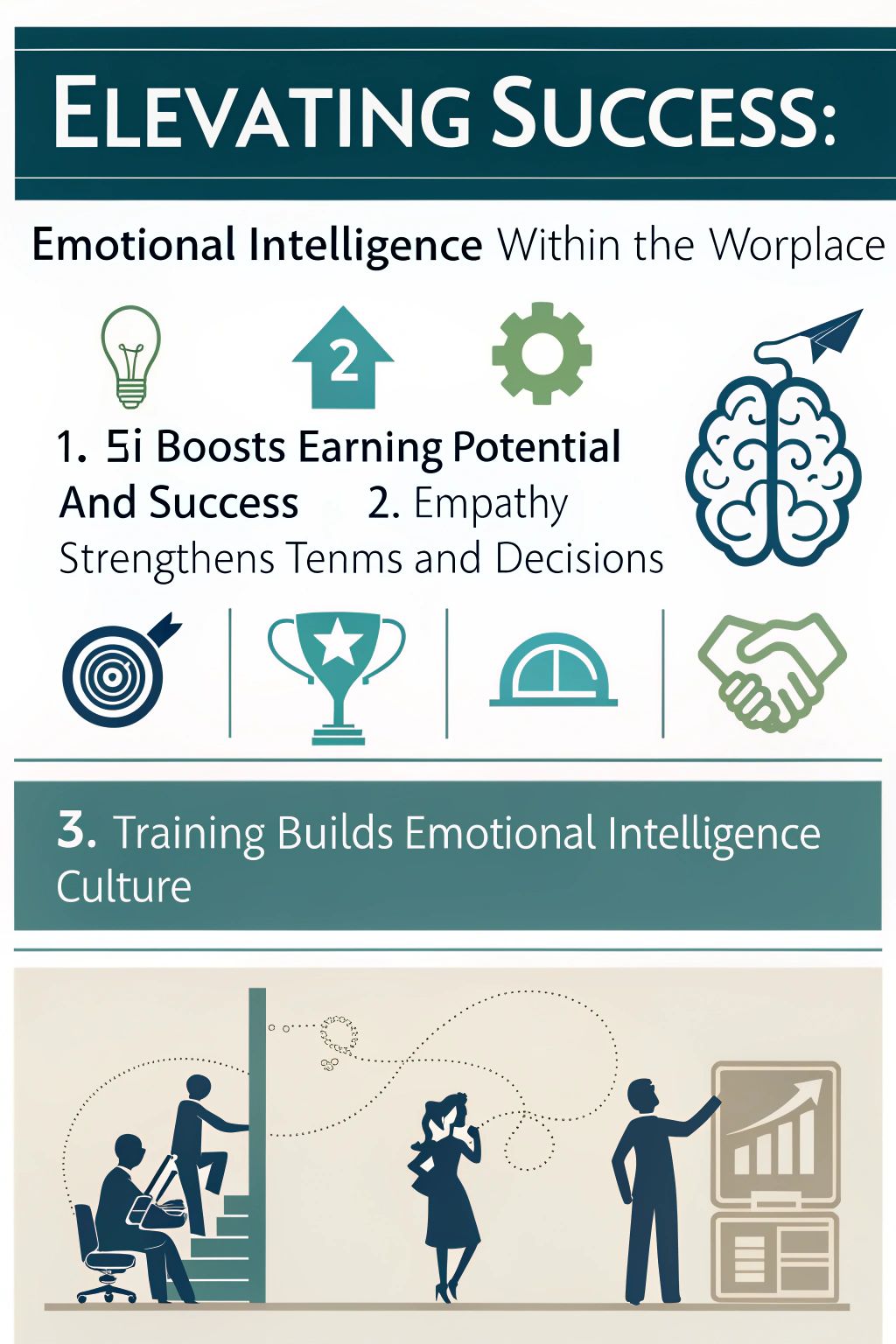Many individuals may struggle to interact harmoniously with others in their professional environments, potentially feeling overburdened or misinterpreted. Such scenarios could result in a less satisfying work experience for all involved.
One element that could introduce positive change is the application of emotional intelligence at work.
It’s beneficial to mention that the renowned psychologist Daniel Goleman brings to light self-awareness, self-regulation, motivation, empathy, and social skills as the constituents of emotional intelligence.
Through our blog, we will suggest strategies to enhance these aspects in your personal and professional life. Therein, you will acquire knowledge on how to more effectively comprehend and control emotions, be they your own or those of others.
Prepare yourself for a transformation towards a more harmonious workplace.

Understanding Emotional Intelligence

Understanding Emotional Intelligence is essential in the workplace. It covers self-awareness, self-regulation, social understanding, and relationship management – vital elements for successful interpersonal interactions and professional achievement. Emotionally intelligent individuals are skilled at identifying their emotions, handling stress, comprehending others’ emotions, and nurturing positive relationships to improve teamwork and overall productivity within an organisation.
Definition and Relevance in the Workplace
Emotional intelligence (EI) is the capability to comprehend and manage one’s own emotions, and also to perceive and sway the feelings of others. This concept was first introduced by John Mayer and Peter Salovey in 1990.
Eventually, Daniel Goleman popularised it by emphasising its significant role in guiding leadership within firms. According to research by Travis Bradberry, only 36% of individuals possess emotional intelligence.
In professional environments, EI and its merits are key for individuals and teams to realise their full potential. It aids leaders in leading groups more efficiently and enables team members to collaborate harmoniously.
Employees with a high level of emotional intelligence earn approximately $29,000 more annually than those without it, based on the data from TalentSmart. This evidences the significance of EI in excelling in professional life and within organisations as a whole.
The Four Components: Self-Awareness, Self-Management, Social Awareness, Relationship Management
Understanding oneself comprises recognising one’s strong points, areas for growth, and the impact of emotions on others. It entails understanding what one excels at and what could use some refinement.
It also covers acknowledging how one’s disposition can affect colleagues in the occupational setting. Those possessing a high degree of self-understanding frequently have a more accurate perception of their emotional reactions and how those can alter their work environment.
Self-governance pertains to managing one’s emotions effectively, particularly in stressful situations, and maintaining an upbeat attitude amidst difficulties. Professionals who excel in self-governance circumvent emotional outbursts at work by utilising techniques like controlled breathing or brief breaks to effectively control stress.
Consciousness of social dynamics allows employees to understand their coworkers’ emotions and respond empathetically, which is key for team collaboration. Lastly, managing relationships involves leading teams positively through proficient communication, conflict resolution skills, and mentoring capabilities.
Managers who excel in this field inspire their teams towards achieving shared objectives while sustaining a peaceful work environment.
Emotional Intelligence Without Empathy
Emotional intelligence plays a big role in the workplace. It involves knowing and managing your own feelings and understanding others’ emotions too. However, empathy is a key part that can’t be ignored.
Without empathy, emotional intelligence loses its power to fully connect with others in the work environment. People might think they understand how their colleagues feel but often they’re off mark.
Data shows that 95% of people believe they are self-aware, yet only 10-15% truly are.
DDI ranks empathy as the top leadership skill because leaders who show empathy perform much better in areas like coaching and decision-making. A workplace without empathy can lead to misunderstandings and conflicts because people aren’t genuinely recognising or respecting each other’s feelings.
For emotional intelligence to impact positively on job satisfaction and team dynamics, including it must go hand-in-hand with deep empathetic engagement among employees and leaders alike.
The Impact of Emotional Intelligence on Workplace Dynamics
Emotional intelligence notably improves leadership skills, nurturing a more united and efficient workplace. It also plays a crucial role in enhancing team collaboration and communication, as well as aiding conflict resolution and stress management within the organisational environment.
Enhances Leadership Skills
Leaders possessing a high degree of emotional intelligence (EI) promote improved working conditions. They effectively involve their teams, leading to enhanced productivity in all respects.
Korn Ferry’s research revealed that managers exhibiting strong EI retain 70% of their team for a period exceeding five years. It indicates the significance of emotional comprehension and regulation in leading roles.
Such leaders pay attention to and meet their team’s requirements, demonstrating empathy and societal cognisance. Their capability to control emotions enables them to provide precise feedback and inspire others towards common objectives.
A high EI in leaders not only betters job contentment but also promotes employee loyalty and efficacy, validating that abilities beyond technical proficiency are necessary for accomplished leadership.
Improves Team Collaboration and Communication
Emotional intelligence plays a big role in team collaboration and communication. With high emotional intelligence, employees can better understand each other’s feelings and viewpoints.
This understanding leads to stronger teamwork and smoother conversations at work. Workers with high emotional intelligence are also great listeners. They give useful feedback that helps everyone improve.
This skill is as valuable as technical abilities in the workplace. Surveys show that 71% of employers value emotional intelligence more when they pick new team members. Also, 75% think about it for promotions and raises.
Teams where people listen and communicate well are more likely to solve problems faster. They manage stress better too, making them stronger together.
Facilitates Conflict Resolution and Stress Management
Emotional intelligence becomes a vital tool in resolving disputes and managing tension in the workplace. Individuals possessing high emotional intelligence leverage their abilities to regulate emotions during stressful scenarios, converting discord into constructive dialogue.
This skill proves valuable for nurturing a favourable work environment.
Motorola, in a particular case study, observed a 93% surge in productivity when their personnel were trained in emotional intelligence and stress control, underscoring the significance of these skills for commercial achievement.
Workers who can acknowledge and manage their emotions aid in diminishing unnecessary time spent in disputes, thus contributing to a more effective and congenial workplace.
Cultivating an Emotionally Intelligent Workplace Culture
Cultivating an emotionally intelligent workplace culture involves implementing strategies for developing emotional intelligence in employees and fostering emotional intelligence as a critical part of the work culture.
The role of leadership in this process is equally essential, promoting the understanding and management of emotions to enhance team collaboration and communication, ultimately elevating success within the workplace.
Read more about enhancing success through emotional intelligence within the workplace.
Strategies for Developing Emotional Intelligence in Employees
Managers should sign up workers for courses in emotional intelligence, mindfulness, and stress handling. These classes help them get better at understanding their own feelings and those of others.
They also learn to manage stress well. Such training is a part of developing emotional intelligence skills necessary in the workplace.
Team-building activities are key to improving relationships among staff. They let employees work together outside of regular tasks, boosting teamwork and communication skills. Open talks and regular constructive feedback support an environment where everyone feels heard and valued.
Writing down thoughts on emotions teaches self-awareness and reflection on decisions’ impacts. The use of 360-degree reviews helps spot areas that need work that the person might not see themselves.
Role of Leadership in Fostering Emotional Intelligence
Leadership plays a crucial role in nurturing emotional intelligence within the workplace, thus driving positive outcomes. Insightful leaders with high emotional intelligence have been found to enhance team collaboration, communication, and productivity.
Studies by DDI highlighted that empathetic leaders display over 40% better performance in coaching, engaging others, and decision-making. Additionally, TalentSmart has identified emotional intelligence as the most robust predictor of employee performance.
These findings underscore how leadership significantly influences the development of an emotionally intelligent workplace culture. Leaders who exhibit high emotional intelligence are able to effectively manage relationships and navigate conflicts while fostering a sense of psychological safety among their teams.
By embracing these traits in their leadership style, they play a crucial role in reinforcing the importance of emotional intelligence within the organisational ethos and inspire employees to develop this essential skill set for individual and collective success.
Conclusion
Emotional intelligence plays a pivotal role in the workplace, influencing leadership, teamwork, and overall success. Individuals with high emotional intelligence exhibit strong interpersonal skills, effective conflict management, and thoughtful decision-making.
Cultivating an emotionally intelligent workplace culture is essential for promoting understanding, empathy, and cohesive relationships among employees. Ultimately, nurturing emotional intelligence within the workplace can lead to enhanced collaboration, improved job satisfaction and heightened performance across teams.
For further insight into how emotional intelligence functions independently of empathy within professional settings, please visit Exploring Emotional Intelligence Without Empathy in the Workplace.
MindOwl Founder – My own struggles in life have led me to this path of understanding the human condition. I graduated with a bachelor’s degree in philosophy before completing a master’s degree in psychology at Regent’s University London. I then completed a postgraduate diploma in philosophical counselling before being trained in ACT (Acceptance and commitment therapy).
I’ve spent the last eight years studying the encounter of meditative practices with modern psychology.

